In today’s rapidly evolving digital advertising landscape, Google Ads has emerged as an indispensable tool for businesses aiming to effectively reach their target audience. To optimise ad campaigns and achieve desired results, advertisers must make informed bidding decisions. Fortunately, Google Ads bidding scripts offer a powerful solution that can streamline and enhance bidding strategies, ultimately saving time and improving campaign performance. In this article, we will delve into the benefits of using bidding scripts and provide valuable insights into how they can help you achieve your advertising goals.
Google Ads bidding scripts are snippets of code that advertisers can implement within their campaigns to automate bidding decisions. These scripts utilise JavaScript code to manipulate bids based on various parameters, such as performance metrics, analysis, and historical data. By automating bid adjustments, advertisers can optimise their ad spend and ensure they are bidding competitively in real-time.
It’s worth mentioning that bidding scripts can be applied at various levels within Google Ads, including campaign, ad group, or even keyword level, providing granular control over bidding strategies. Advertisers can implement different scripts for different campaigns or objectives, tailoring their bidding approach to specific goals and budgets.
In conclusion, Google Ads bidding scripts offer advertisers a powerful solution to automate bidding decisions and optimise ad spend. By utilising JavaScript code snippets, advertisers can manipulate bids based on performance metrics and real-time data, ensuring competitive bidding and efficient allocation of resources. The automation and customisation provided by bidding scripts enable advertisers to streamline their bidding processes, save time, and make data-driven decisions that drive better campaign performance.
The Benefits of Bidding Scripts
One of the key advantages of bidding scripts is their ability to strike a balance between manual CPC bidding and automated bidding by Google. By leveraging these scripts, advertisers can enjoy the benefits of manual bidding control while capitalising on time-saving automation and efficiency improvements. Bidding scripts enhance the accuracy of manual CPC bidding by calculating bid adjustments more effectively than a human counterpart.
Bidding scripts excel in the realm of Cost per Acquisition (CPA) bidding as well. By using CPA bidding, advertisers can ensure consistent profitability across all keywords by achieving the optimal mix of volume (sales/leads) for a target CPA. Bidding scripts play a crucial role in facilitating this process by automatically adjusting bids based on specific CPA targets, enabling advertisers to maximise their return on investment.
Another advantage of using bidding scripts is the ability to customise bidding strategies based on specific goals and performance metrics. Advertisers can define rules and conditions within the script to dynamically adjust bids according to their objectives. For example, if the goal is to maximise conversions while maintaining a specific target cost per conversion, the script can automatically adjust bids to achieve the desired balance between volume and cost efficiency.
Additionally, bidding scripts allow advertisers to leverage real-time data and insights for informed bidding decisions. These scripts can gather data from various sources like Google Analytics or third-party APIs to analyse user behavior, market trends, and competitor activities. By incorporating this data within the script, advertisers can make bid adjustments that align with current market conditions, ensuring their campaigns remain competitive and effective.
The automation aspect of bidding scripts is particularly valuable in dynamic and fast-paced digital advertising landscapes. Instead of manual monitoring and bid adjustments prone to human error, bidding scripts execute bid adjustments automatically and quickly. This frees up advertisers’ time to focus on other strategic aspects of their campaigns, such as creative development, audience targeting, or overall campaign optimisation.
In summary, Google Ads bidding scripts offer a range of benefits, empowering advertisers to effectively optimise their bidding strategies. By leveraging these scripts, businesses can strike a balance between manual control and automation, ultimately improving bidding accuracy, saving time, and achieving desired advertising goals. Whether enhancing manual CPC bidding or leveraging CPA bidding, bidding scripts serve as a game-changing tool in the digital advertising arsenal. If you are new to bid management, check out our articles on Bidding Basics and Bid Adjustments.
Google's Bid Multiplier Script
In today’s digital advertising landscape, Google Ads bidding scripts provide advertisers with a powerful tool to optimise their bidding strategies. One notable script is the Bid Multiplier Script offered by Google, which allows advertisers to bid on a wide range of metrics, including CPA, ROAS, average session duration, quality score, bounce rate, and more. By leveraging this script, advertisers can choose a primary objective, such as ROAS, CPA, or session duration, and tailor their bidding strategy accordingly. The script operates within Google Ads, with objectives and rules set within a spreadsheet. Let’s explore some examples of how bidding scripts can be used in different situations:
1. Maximising ROAS (Return on Ad Spend):
If your primary objective is to maximise your ROAS, you can utilise the bidding script to automatically adjust bids based on the performance of your ads. By setting specific ROAS targets and allowing the script to optimise bids accordingly, you can ensure that your advertising efforts generate the highest possible return on investment.
2. Cost-Effective CPA (Cost per Acquisition):
For advertisers focused on achieving a specific target CPA, bidding scripts can be incredibly valuable. By defining your desired CPA and leveraging the script, you can automate bid adjustments to drive conversions at the most cost-effective rate possible. This enables you to efficiently allocate your budget while ensuring the desired acquisition costs are met.
3. Enhancing User Engagement:
If your objective is to improve average session duration or reduce bounce rates, bidding scripts can help optimise your campaigns accordingly. By setting performance goals for these metrics and utilising the script to adjust bids, you can encourage higher engagement and reduce the likelihood of visitors leaving your website too quickly.
It’s important to note that bidding scripts offer flexibility, allowing you to tailor your strategies to specific business goals. By setting objectives and rules within the spreadsheet, you can customise the script to align with your unique advertising needs.
In conclusion, Google Ads bidding scripts, such as the Bid Multiplier Script, provide advertisers with a versatile solution to optimise their bidding strategies. Whether you aim to maximise ROAS, achieve a cost-effective CPA, or enhance user engagement metrics, these scripts empower you to automate bid adjustments and drive better campaign performance. By leveraging the capabilities of bidding scripts, advertisers can unlock new levels of efficiency and effectiveness in their digital advertising endeavors.
CPA Bid Manager
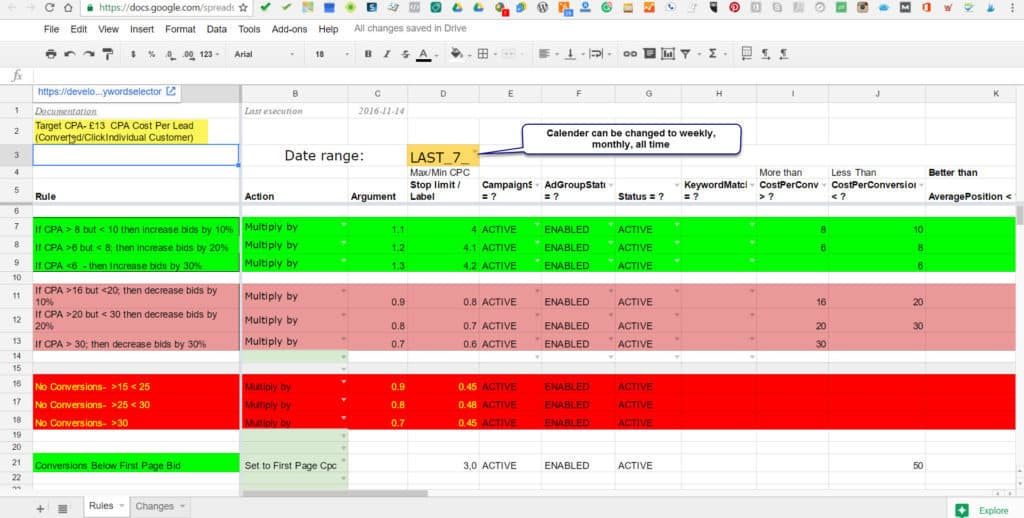
The Google Sheet templates are categorised based on objectives, such as CPA, ROAS, and position/brand. The provided sheet specifically pertains to CPA bidding.
Each spreadsheet consists of three levels for adjusting bids to align with the advertising objective, along with a bid increase rule below the first page.
The three levels are as follows:
1. Increase bids if the profit per conversion exceeds the target. This level aims to capitalize on higher profitability.
2. Decrease bids if the profit per conversion falls below the target. This level focuses on cost efficiency.
3. Decrease bids if there are no conversions. This level helps mitigate spending on non-performing keywords.
Within each bidding level, there are three rules, which are further categorized into increments of 10%, 20%, and 30% for bid increases or decreases.
To achieve the desired CPA, the script is scheduled to run and make bid adjustments using specific bid modifiers. For bid increases, the modifiers are set as 1.1, 1.2, and 1.3, while for bid decreases, the modifiers are 0.9, 0.8, and 0.7. These modifiers determine the extent of bid adjustments.
The “stop level” column serves as a control mechanism to prevent bids from going excessively high or low. It ensures that bids remain within a reasonable range.
The “cost per conversion” columns provide a snapshot of the cost per conversion values before implementing the bid adjustments, allowing advertisers to track the impact of the changes on their campaign performance.
In summary, the Google Sheet templates offer a structured approach to bidding adjustments, with specific levels and rules based on the advertising objective. By utilising the provided bid modifiers and monitoring the cost per conversion, advertisers can make informed bid adjustments to optimise their campaigns and achieve their target CPA.
ROAS Bid Manager
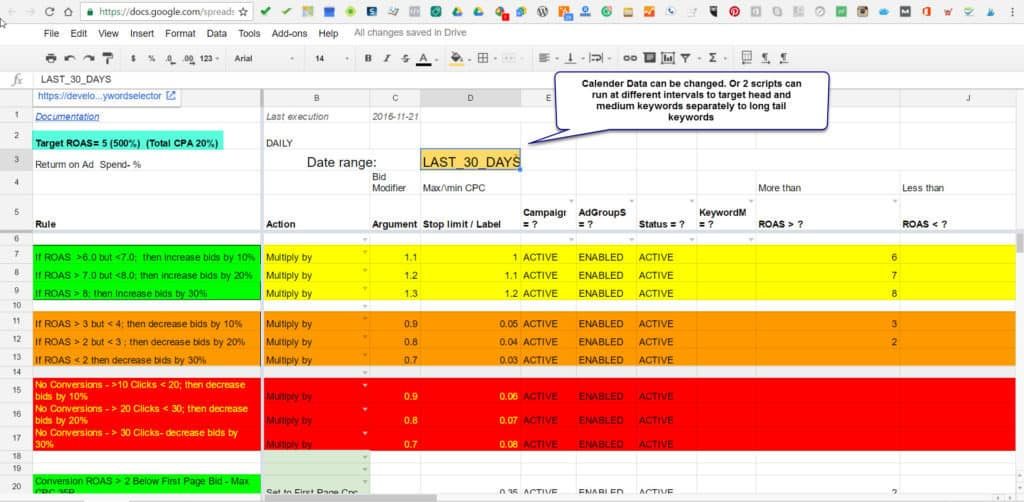
Now the Rules have been changed for adjusting to a target ROAS. The columns on the right show the return on ad spend level before making the bid change. The number 6 is the same as 600%.
Bid Manager Settings
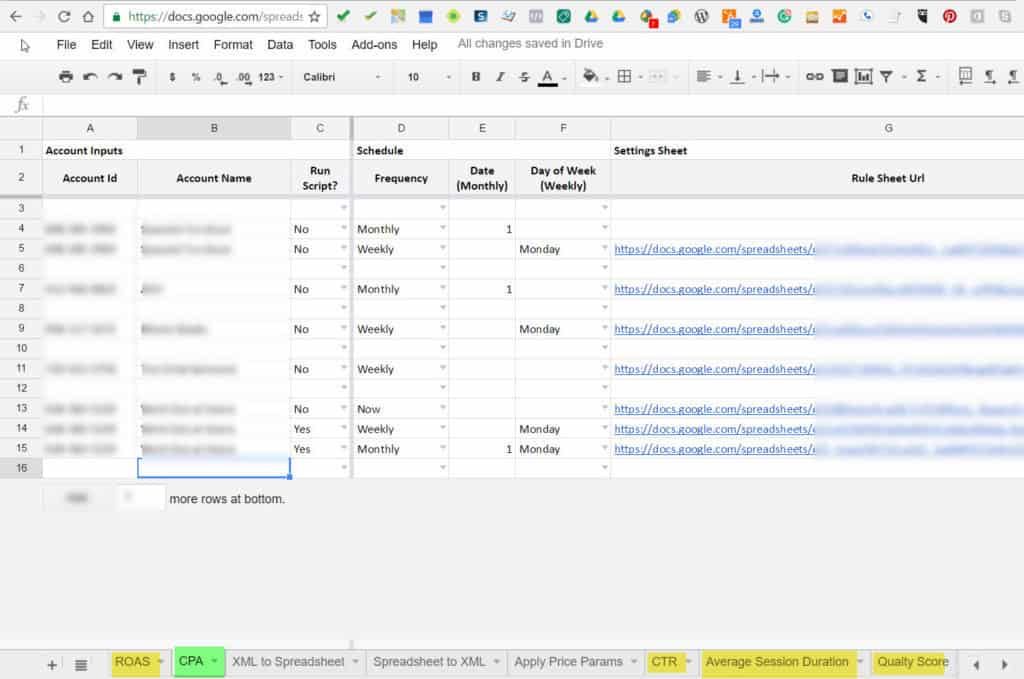
The scheduling of scripts can be set to run over different periods. Having 2 separate scripts to deal with head keywords over a short period, and long tail keywords over a longer period.
Average Session Duration Bid Manager
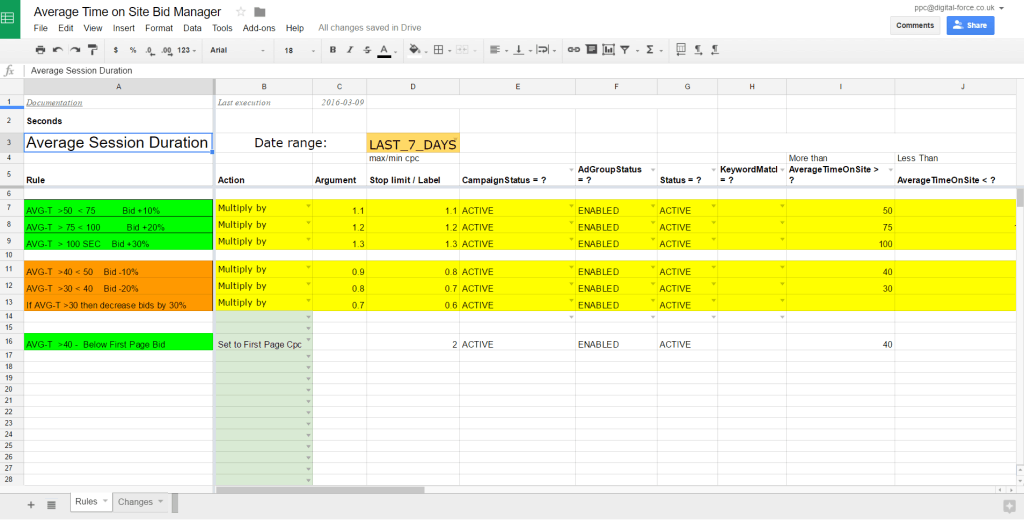
For example, newer accounts without conversion data can optimise using another metric such as CTR or average session duration. Average time on site is measured in seconds.
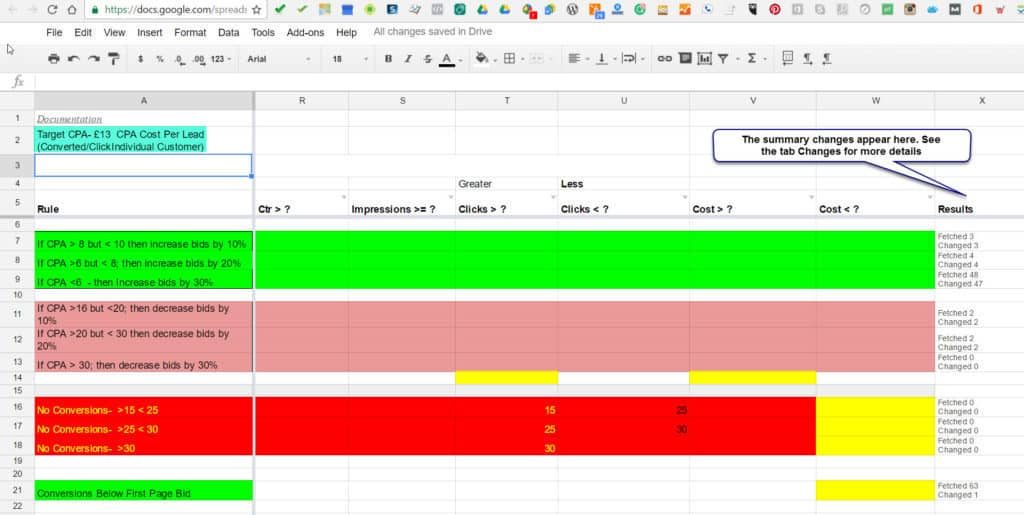
Data Validation shows the changes that happen. These can be previewed before running.
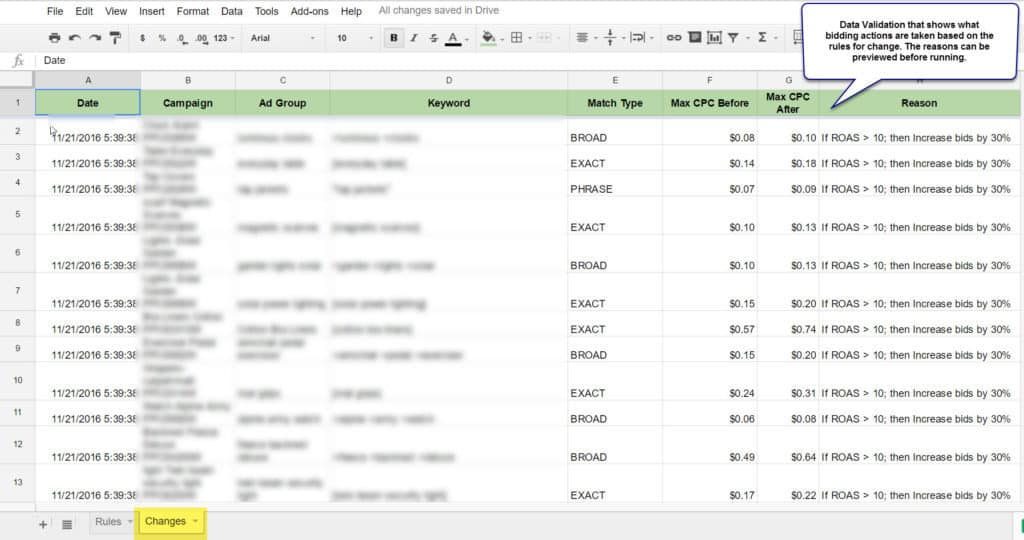
More background on bidding concepts
CPA bidding is a well-known and effective strategy for achieving maximum leads or sales at the lowest cost. CPA refers to the cost per lead or sale, while ROAS represents the return on ad spend.
Although CPA and ROAS are similar, ROAS is particularly advantageous when the CPA is not a fixed amount.
However, it is essential to note that conversion tracking must be installed and run for a sufficient duration to establish statistically significant results. In the absence of enough conversion data, other metrics such as CTR, quality score, or website engagement metrics like average session duration or key page views can be utilised.
Our Google Ads bidding script is versatile and can be employed at various stages of optimisation. It can initially focus on CTR or quality score, then transition to average session duration, and ultimately target CPA or ROAS. This approach not only saves money during the testing stages but also increases targeted traffic before conversion tracking accumulates enough statistically significant data on the performance of the Google Ads account.
For advertisers who have not installed conversion tracking, Google introduced small goals, which provide industry-average conversion rates for each keyword being advertised. While this offers useful short-term insights, it is important to recognize that these metrics do not reflect the specific data of your own website and company.
Alternatively, another option is to utilise visitor behavioral metrics from Google Analytics until conversion tracking is established, or in cases where setting up conversion tracking on the website is not feasible. Bidding on the average session duration of each keyword can serve as a consistent and reliable Key Performance Indicator (KPI).
In summary, CPA bidding is an effective strategy for achieving cost-efficient leads or sales. While conversion tracking is ideal, metrics such as CTR, quality score, or website engagement can be used in the absence of sufficient conversion data. Our Google Ads bidding script accommodates various stages of optimisation and provides flexibility in targeting different metrics. Whether leveraging industry-average conversion rates or visitor behavioural metrics, advertisers can make informed bidding decisions and improve their advertising performance.
Tips for Using Bidding Scripts
1. Clearly Define Your Objectives:
Before implementing bidding scripts, clearly define your advertising objectives. Whether it’s maximising ROAS, achieving a specific CPA, or improving engagement metrics, having a clear objective will help guide your bidding script implementation.
2. Start with Conversion Tracking:
Bidding scripts work best when conversion tracking is in place. Ensure that conversion tracking is properly set up and functioning before implementing bidding scripts to leverage accurate data for bid adjustments.
3. Test and Refine:
Bidding scripts provide flexibility, allowing you to test different bidding strategies and parameters. Start with smaller campaigns or ad groups to test and refine your bidding scripts before applying them to larger-scale campaigns.
4. Leverage Historical Data:
Bidding scripts can utilise historical data to inform bid adjustments. Ensure you have sufficient historical data available to establish trends and patterns for more accurate bidding decisions.
5. Monitor Performance Regularly:
Keep a close eye on the performance of your bidding scripts. Regularly review and analyse the results to identify areas for improvement and make necessary adjustments.
6. Utilise Multiple Levels and Rules:
Take advantage of the flexibility offered by bidding scripts by setting up multiple levels and rules. This allows you to fine-tune bid adjustments based on different performance metrics and objectives.
7. Consider Market Conditions:
Bidding scripts can incorporate real-time data and insights. Stay aware of market trends, competitor activities, and other relevant factors to adjust your bidding strategy accordingly.
8. Test Different Bid Modifiers:
Experiment with different bid modifiers to find the optimal balance between bid increases and decreases. Test varying percentages to determine which adjustments yield the best results for your advertising goals.
9. Start Conservative, Then Optimise:
When implementing bidding scripts, it’s advisable to start with more conservative bid adjustments. Monitor the performance closely and gradually optimise your bid modifiers based on the data and results you observe.
10. Regularly Review and Update Scripts:
As your campaigns evolve and goals change, review and update your bidding scripts accordingly. Regularly evaluate your bidding strategies and make necessary adjustments to align with your current objectives.
Remember, bidding scripts can be powerful tools, but it’s essential to continually monitor and optimise their performance to ensure they align with your advertising goals.
Summary
In conclusion, bidding scripts have transformed digital advertising by providing a powerful tool to optimise bidding strategies. With Google’s range of bidding techniques, including manual bidding with customisable bid modifiers, advertisers have control over their bids.
Google offers a vast range of bidding techniques and strategies ranging from manual, automated and machine learning. With manual bidding options, you can change the base bid, as well as bid modifiers (e.g. locations, devices, demographics, remarketing lists and more).
You can also opt for a totally automated bidding strategy from Google using machine learning. We cover these topics in separate articles namely, Google Ads Bidding Strategies and Google Ads bid modifiers.
This bidding script gives you the control of manual bidding, with the advantage of not having to manually make the changes, as well as precision calculations to the base bid.
Bidding scripts strike a balance between manual control and automation, improving accuracy and efficiency. By leveraging real-time data and insights, advertisers can make informed bidding decisions and achieve their specific goals, whether it’s maximising ROI, hitting target CPAs, or improving engagement metrics.
Incorporating bidding scripts into your digital advertising strategy can save time, enhance performance, and drive better campaign results. With the ability to automate bidding adjustments, advertisers can focus on other strategic aspects of their campaigns. Embrace the power of bidding scripts and take your advertising efforts to new heights.











6 thoughts on “Google Ads Bidding Scripts – CPA ROAS Avg Session Duration & More”
hey guys!
I have a challenge for you. I need a ROAS script that take into account the “All.conv Value/Cost” when running for ROAS, and not the “Conv.Value/Cost”.
Reason being that this is for app campaign on search network, we are pulling in several values so no conversion values show up in the normal “Conversion value” column.
How can we solve this ? Got a script we can buy from you ?
Best regards, Stein
Is it a free spreadsheet or it’s one of your products for sale?
Hi Marcos,
We provide the script and setup services at a charge. If you would like more info, just let me know.
Best Regards
Liam
Hi, Liam.
I am interested in setup of this script.
How could we talk about it?
Hi Alex,
Apologies for the delay. I just your post.. You can email us at [email protected] if it is not too late for you.
Best Regards
Liam
Thank you for your contact, maybe this will help us.